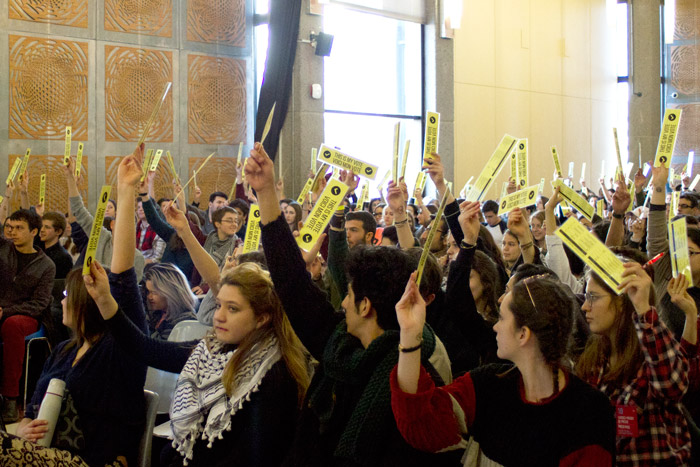With a voter turnout rate of 17.5 per cent, the lowest since 2005, McGill students voted on a myriad of issues in the Students’ Society of McGill University (SSMU) Winter 2016 Referendum. Among them were the hotly debated amendments 13.2 and 13.3, which would have created a General Assembly (GA) Steering Committee with the power to block motions from debate at a GA. Students rejected the motion with a slim majority of 52.6 per cent. This was the right decision. As discussed on the Tribune’s McGill Matters podcast, the proposed steering committee would have undermined SSMU as a representative body while doing little to actually alter the divisive nature that contentious motions create on campus; however, the amendments were motivated by a real concern among students that SSMU is too political. The steering committee was not the answer, but the question of how SSMU can work to address these concerns remains.
[audiotrack title=”McGill Matters, EP. 1: When SSMU is confronted with external and divisive issues” songwriter=”Zachary Carson, Albert Park, and David Watson” date=”March 18, 2016″ width=”700″ height=”200″ src=”https://24f2041bb5b609d25f1a97039f71682cc9154421.googledrive.com/host/0B9rQxTeDv2duM0FmSjBSYkZFS1k/mcgillmatters1.mp3″ autoplay=”on”]
Amendments 13.2 and 13.3 were proposed after this year’s iteration of an ever present and hotly debated motion—for SSMU to support the Boycott, Divestment, and Sanction (BDS) movement against the Israel for its occupation of Palestinian territory. BDS motions have become synonymous with intense debate on campus, which some—especially those who campaign against them—have described as too divisive. As such, It is easy to assume that the idea of a steering committee arose specifically to block future BDS motions from the GA; however, to assume this is to ignore a much more pervasive concern among students that goes beyond one single issue; that SSMU is being too political. In the 2014-2015 SSMU Student Experience Survey, almost a quarter of student respondents felt uncomfortable on campus because of their political beliefs and less than 20 per cent of students felt that SSMU represented their political beliefs.
The proposed steering committee would not have addressed these concerns. It would have undermined SSMU as a representative body as an unelected committee would have veto power on GA motions. It would have also increased divisive debate on campus. Blocking a potential GA motion on the grounds of “divisiveness” would have meant SSMU was effectively against the motion (the “No” campaign against BDS continually cited divisiveness as a reason to vote against). But to think that rejecting the amendments means the end of these concerns on campus is just as naïve as to think the steering committee would have addressed them. It was rejected with a slim majority, which still means that a significant number of students felt uncomfortable enough with the nature of debate on campus to vote in favour the amendments. SSMU needs to continue to work to develop a better way to address the concerns of those who believe that SSMU is being too political without completely sidelining those who want to use the body as a platform for political stances.
Neither side of this debate is wrong. At the core of each perspective is a desire for students to feel comfortable on campus and believe that their interests are represented by their student government. It may seem impossible to demand that SSMU somehow reconcile the desires of groups who want contradictory things, but this is a challenge that all governments operating at any level face. No one expects the answer to be perfect, but one failed attempt should not deter future attempts to work towards a solution.
Podcast: Play in new window | Download





